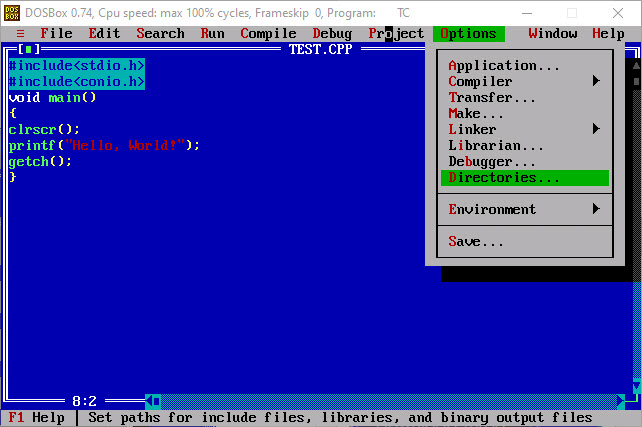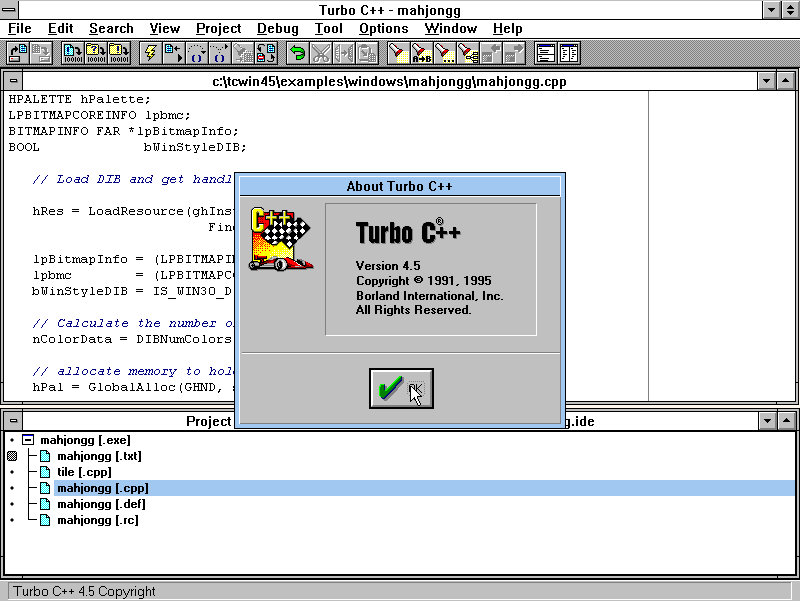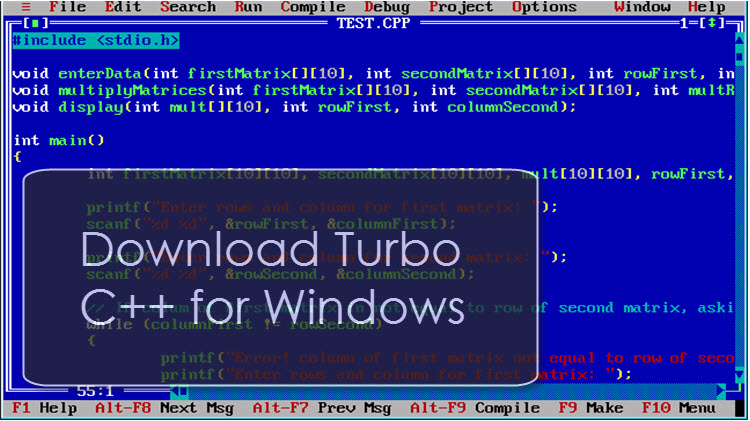Porting Borland TurboCsource code to GNU gcc
|
TurboC in a nutshellTurboC is a linkable library and a set of C header files that make iteasier to port C code originally written for Borland's MS-DOS basedTurbo C compiler to GNU gcc -- and therefore to a wide varietyof *nix computer platforms. Generally speaking, it is thefollowing:
Why was TurboC created?
Alternate Approaches
Features and Deficiencies of TurboC
Download and Install TurboC
Mac OS X
Future plans
What's with the cute logo?
- An implementation via ncurses of conio.h from Turbo C.
- An implementation via Xlib of graphics.h from Turbo C.
- A few other functions and time-saving features thrown in forconvenience.
- A means of overcoming the integer datatype discrepancies betweenTurbo C and GNU gcc.
Ddp yoga videos download. TurboC is available as free softwareunder the GNU Lesser General Public License (LGPL).
I have written quite a lot of MS-DOS based software using Borland'sTurbo C 2.0 compiler. When the inclination finally hit me to makesome ofthis otherwise-deceased code available as free software, my firstinnocent idea was to release it under the GPL, simply labeling ithonestly as MS-DOS code, and then later to port the code to *nix astime and interest permitted. It was obvious that directly portingto *nix up-front would be a time-consuming task.But I ran into a snag. It's no good to release software ifthere's no way for anybody to find out about it. My preferredchannel for announcingopen-source software is freshmeat,butfreshmeat doesn't 'do' MS-DOS (and therefore politely declined toaccept my MS-DOS projects).
Download version 4.13 (12/12/92). This archive also includes a swapping replacement for the Turbo Pascal Exec function. System Requirements: Compatible 16-bit C compiler (known to work with Turbo/Borland C and MS C v6/7), or Turbo Pascal. AMISLIB A function library to write self-highloading, removable TSRs in assembler. Download Turbo C for Windows 10, 7, 8 and 8.1; Turbo C Common Problems Solution; Turbo C IDE Shortcuts Keys; Turbo C Installation Process – A Complete Guide; Download TurboC 7 by Akki Latest Version For Windows; Download TurboCdroid For Android Mobile Phones; Download Shareme For PC Windows 10, 7, 8 and 8.1. Get notifications on updates for this project. Get the SourceForge newsletter. Get newsletters and notices that include site news, special offers and exclusive discounts about IT products & services.
Apparently, necessity really is the mother of invention. Itoccurred to me that if I could provide appropriate Turbo C compatiblelibraries andheader files, then the effort of porting Turbo C code to *nix would begreatlysimplified. In other words, it would be relatively easyto provide*nix versions of the old MS-DOS code. Whether it's absolutelyeasy or not depends a lot on the program you're trying to port.
For conio.h functionality, you might consider Pablo Vidal's UConio libraryinstead. I've not used it, and don't know its advantages anddisadvantages. It certainly supports a much smaller subset of conio functionality thanTurboC,and requires you to modify your source code much more extensively.Borland supposedly has (or willsoonhave) a Linux version of their C++ compiler. At this point, thenature,price, and target platforms of this compiler are mysteries. One presumes that (like Kylix) itwillbe Wine-based, and therefore willworkonly on 'x86 systems. Nevertheless, if it contains the variouslibraryfunctions implemented in the TurboC library -- and frankly, that's a verybig 'if' -- it might provide a simpler means of porting your TurboCprograms to Linux. Speaking for myself, even though I have been along-timeBorland user, I philosophically prefer to compile my program with GNU gcc.
For graphics.h functionality, there is the GRX library of Csaba Biegl,MichaelGoffioul, and Hartmut Schirmer. I didn't discover this libraryuntilI had only a few graphics.h functions left to write, and I haven'tfullyevaluated it. Its stated aim is to be a multi-platform 2Dgraphicslibrary. Its website does not advertise (or even mention) Turbo Ccompatibility. However, it contains quite a few functions of the same name (and,apparently,the same functionality) as Turbo C library functions.
Of course, if you are only interested running your programon *nixsystems -- as opposed to porting the program to *nix systems ingeneral-- you might be able to simply run your existing executable using oneofthe freely available DOS emulators for Linux. DOS emulation usingdosemu with freedos works very well on 'x86 systems,while bochs with freedos works well (if somewhat slowly) onnon-'x86*nix systems.

Features
- TurboC provides most of the console-i/o functionality of TurboC'sconio.h header, mapping it to related ncurses functionality. (Currently, every conio function except cscanf is supported.)
- TurboC provides most of the 'BGI' functionality of Turbo C'sgraphics.h header. At present (20020608), implementation of thesefeatures is mostlycomplete except for the temporary lack of stroked-font support.
- TurboC provides a sprinkling of other missing functionality likethe strupr and strlwr functions.
- Check out the complete list ofavailable functions.
Deficiencies
- Refer to the complete list of bugs andissues. So far, the library is only as complete as it needs to befor the kind of programs I typically used to write in Turbo C. AsI port more of myold programs to *nix, the TurboC libraray will presumably become morecomplete. Presently, support for conio.h is essentially complete, and support forgraphics.his essentially complete except for displaying text.
- In the ported program, the text-console window is logicallysizedproperly, but is not physically sized properly unless xterm isused. If other terminals are used (such as KDE Konsole),the window must be resized manually by the user.
- Borland's Turbo C is a 16-bit compiler, whereas the GNU gcccompiler I'm targeting is 32-bit. This results in a discrepancyinthe integer datatypes. TurboC handles the (hopefully) most commoncasesby means of macros; unhandled cases will cause compile-time errors andmustbe fixed manually. This is covered in detail on the usage page.
- Mixing and matching stream-based functionality (like getchar,printf, and so on) with 'console' based functionality (like getch, cprintf, and so on) probably won't work. Again,look at the usage page.
Linux Intel 'x86 (SuSE 8.0)
Linux PowerPC (SuSE 7.3)
FreeBSD (4.5)
 (Early versions of the TurboC library which indicated that they workedwithFreeBSD were probably over-optimistic in that assessment. Pleaseupgradeto a version of at least 20020420, and be sure to follow the advice on running the portedprograms.) The most current development snapshot has been triedonly on SuSE 8.2.
(Early versions of the TurboC library which indicated that they workedwithFreeBSD were probably over-optimistic in that assessment. Pleaseupgradeto a version of at least 20020420, and be sure to follow the advice on running the portedprograms.) The most current development snapshot has been triedonly on SuSE 8.2.Put the libraries (libTurboC.a and libTurboCu.a) wherever librariesnormallygo on your system -- usually /usr/lib, I suppose. Put all of theheaderfiles wherever they normally would go -- /usr/include, I suppose. Or,you can just symbolically link them in these directories. Or, putthemwherever you like and add appropriate -L and -I switches to your gcccommand line.
Here's the way I would do it on my own system:
cd ~You may find (for example, in FreeBSD) that if you #includeTurboC header files in the programs you're trying to port, you getcompiler errors about symbolic links being 'too deep'. In thiscase, remove the '-s' switch from the
tar -xzvf TurboC-dev.tar.gz
cd TurboC-source
.. edit Makefile in FreeBSD ..
make (or gmake)
su
ln -s *.h /usr/include
ln -s libTurboC.a /usr/lib
exit
Also, the Makefile makes certain assumptions about the locations oftheX-window system header files and libraries; if these assumptions arewrong,you may need to alter the compiler switches '-L' and/or '-I' within themakefile. The X-window system is needed to compile the complete library, or toruna ported program, if you use any functions from graphics.h. Ifyoudon't intend to use these functions, you can use ported programs orcompilethe library on a system without X, by editing the Makefile and removingthecompiler switch '-DWITH_X'. Zoo tycoon 2 mac free full version.
[Note: The following instructions were written beforegraphics.h support was added to the TurboC library. This supportrequires the X-windowsystem. Therefore, you must either disable TurboC graphicssupport(by removing the command-line switch '-DWITH_X' from the Makefile), oryoumust install the X-window system. At this point, I've not triedeitherof these with Mac OS X, so you're pretty much on your own.]As most people in the *nix world know, Mac OS X is based onFreeBSD. Knowing this, you might suppose that if the TurboClibrary works on FreeBSD then it will work on Mac OS X. Alas!this optimistic appraisal is revealedas simplistic when viewed in the of harsh light of reality.
The TurboC library has indeed reached the stage where some versions(thoughnot necessarily the current snapshot) compile and partiallywork underMac OS X, if ncurses happens to be installed. Apple doesnotinclude ncurses in Mac OS X -- at least not as of the version10.1release. But ncurses available as a downloadfrommacosx.forked.net.
If you download and install ncurses, you should then be abletobuild the TurboC library as follows:
gunzip TurboC-dev.tar.gzWhat you do after this, is a mystery to me, though. Idon't know how get the TurboC libraries nor the header files installed,becauseIcan't figure out how to get the root-level permissions required to doso! Also, as I've said, the library only partially works. Perhapsit'sa problem in the TurboC library .. perhaps it's a problem in thencursesport. If anyone wants to explain this stuff to me, I'd be happytoknow about it. Otherwise, for me, working with Mac OS X is toomuchlike pulling teeth, so it's going to be quite a while before I work outtheproblems on my own initiative.Well, it's pretty obvious that this kind of project has almost nowheretogo, since its whole purpose is to port code from a long-obsoletecompiler. However, I'll probably add new functions as the need for themarises in myown projects. I might not be motivated to waste my energieswriting functions that don't appear in my
tar -xvf TurboC-dev.tar
cd TurboC-source
make
 Turbo C programs, butif you've createdany such missing functions for yourself, I'd love to add them to thelibrary(crediting you appropriately) if you only tell me about them.
Turbo C programs, butif you've createdany such missing functions for yourself, I'd love to add them to thelibrary(crediting you appropriately) if you only tell me about them.Of course, feel free to tell me about bugs in TurboC. (Before doing so, of course, check out the list of already-knownbugs.) I'll certainly make every effort to fix them.
This is an image of Sister Talk, courtesy of the painter LynnRothan. For my purposes, it represents the almost-twin Ccompilers Borland Turbo Cand GNU gcc. Probably, Lynn had a differentinterpretation in mind. Check out her website.